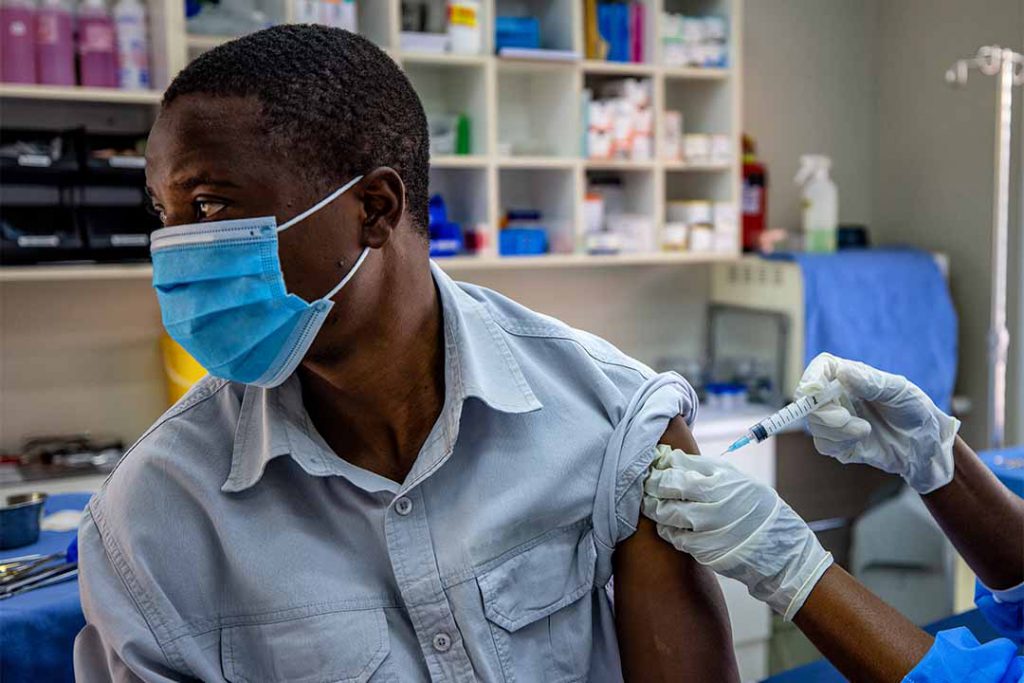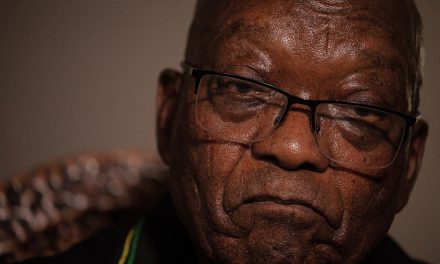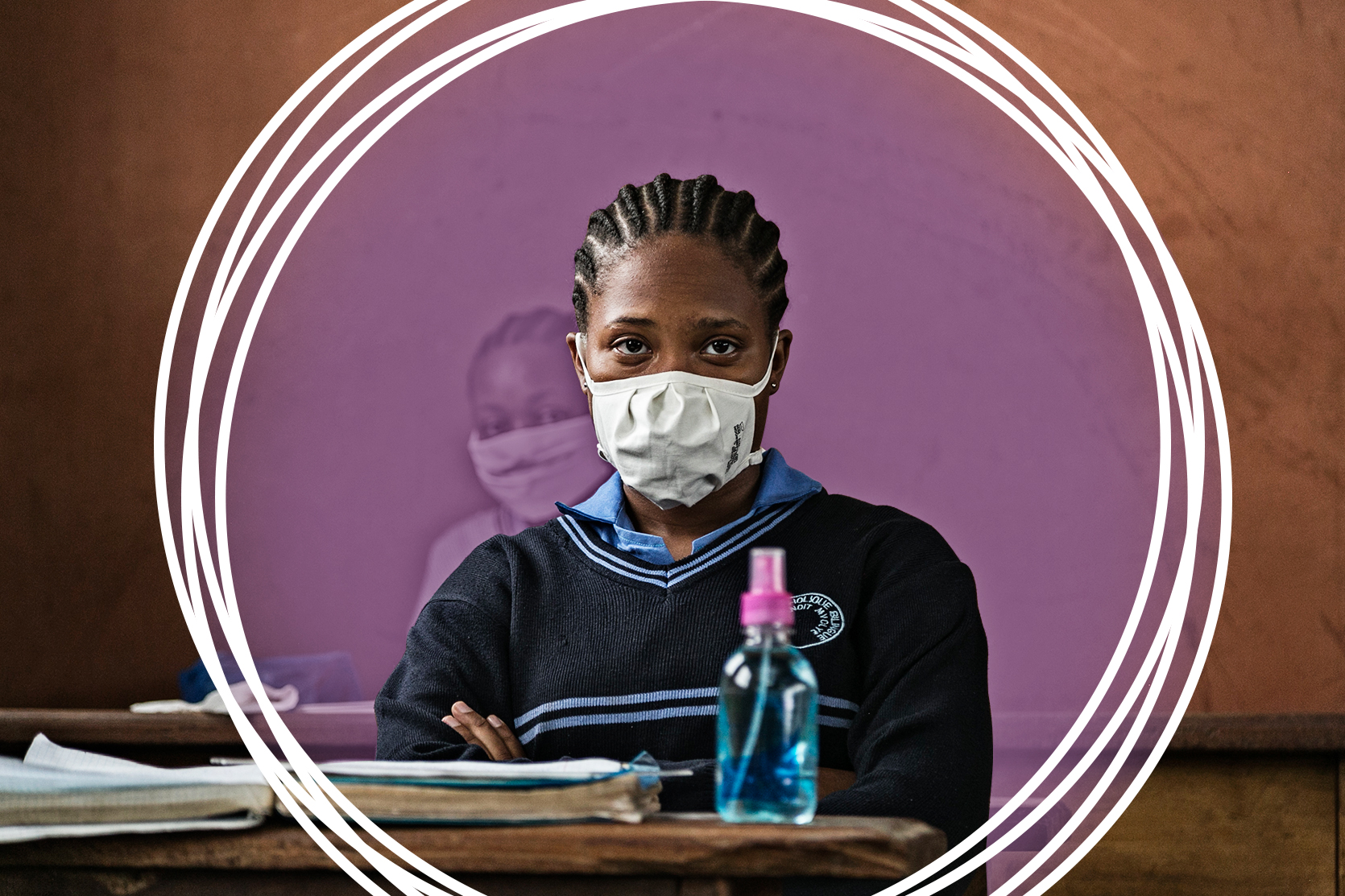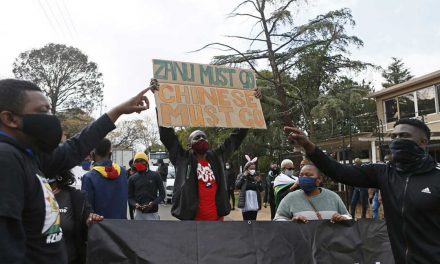New posters have popped up on the streets of South Africa advertising ‘vaccination R150’. At first glance they could be referring to any vaccine, but COVID-19 is likely the disease in question. And recent incidents suggest there is cause for concern.
In November 2020, the South African Police Service raided a warehouse in Germiston east of Johannesburg and discovered a consignment of packages resembling COVID-19 vaccines. They comprised around 2 400 fake doses and large quantities of counterfeit N95 face masks that originated from China worth around R6 million (US$40 000). Days later, INTERPOL issued an orange notice warning for law enforcement agencies worldwide of organised crime networks advertising, selling and administering fake COVID-19 vaccines.

Covid-19 vaccination is intended to provide immunity against Covid-19
In February, police in China dismantled a criminal network responsible for producing and selling water as COVID-19 vaccine shots in Kunshan, eastern China. Police had arrested the syndicate leader in December 2020. It isn’t clear if the fake vaccines seized in South Africa originated from this network, but the syndicate did ship an estimated 600 doses abroad (destination unspecified) on 12 November 2020.
South Africa isn’t the only African country threatened by criminal networks trafficking fake medicines. Counterfeit vaccines have been reported only in South Africa, but this form of organised crime will eventually reach other African countries given the rise in COVID-19 cases on the continent.
Fake medicines are pharmaceutical products sold to deceive the buyers regarding the contents. These products are misbranded, often contain the wrong active ingredient or even toxic substances, and are manufactured by unqualified personnel.
The illegal trade in counterfeit medicines presents a significant threat to Africa. In addition to the negative impact on markets, economies and livelihoods, it also severely affects the health sector. ENACT research shows that these products help spread drug-resistant illness and undermine confidence in health professionals and systems.
Experts believe fake medicines and supplies are the most lucrative sector within the counterfeit market. While the market size is difficult to measure, it’s estimated to be billions of US dollars annually. Africa bears the brunt of this.
The World Health Organization reports that between 2013 and 2017, 42% of all cases of counterfeit medication reported were in Africa. However, this figure was probably higher, considering that not all cases are reported.
Africa is a suitable target for forgers of medicines because it lacks adequate responses, such as supply chain regulation and track-and-trace technology. Furthermore, between 70% and 90% of pharmaceutical products in sub-Saharan Africa are imported, and this market is set to increase in the next few years. This trend presents an ideal opportunity for counterfeiters to exploit.
Fake medicine is good business for various reasons. It is a highly profitable market with a low risk of detection for organised crime groups. The technology required to manufacture these products is simple and easy to obtain. Marketing and distribution are relatively easy to establish, as is the infiltration of distribution channels.
The high demand for medicines in Africa and the lack of local production in many countries have enabled criminal networks to flood the market with counterfeit products. Fake anti-malarial medicines lead to thousands of deaths annually across the continent.
The rush to acquire COVID-19 vaccines in many African countries presents a perfect opportunity for organised criminal groups to exploit the situation. With vaccine hoarding by developed countries, and the virus not abating, poorer countries are scrambling for vaccines. Current estimates are that nearly 70 lower-income countries will only vaccinate one in 10 people at the current pace.
The potential market for transnational organised syndicates is massive. Unlike malaria, which affects certain regions in Africa, COVID-19 affects every country. Criminal networks will profit as the roll-out of vaccines on the continent lags far behind demand. Cases such as those occurring in South Africa are likely to become the norm.
So how do we mitigate this looming threat? A first step is to raise public awareness through social media platforms and others about counterfeit medicines and fake COVID-19 vaccines. Law enforcement officers need training to enable them to identify these pharmaceuticals.
Business and governments need to strengthen supply chains. Border authorities should improve the regulatory oversight of transhipped goods, and countries must enhance their anti-counterfeiting legislation. Information sharing between countries of origin, transit and destination should be encouraged.
A longer-term goal that would benefit the continent is to incentivise the production of medicines in Africa. This step would reduce the dependence on imports from outside the continent and create new supply chain networks. Presently South Africa, Kenya and Nigeria are the major manufacturers with export capacity.
COVID-19 has created a high demand for vaccines, which has opened lucrative markets for organised criminal groups to exploit. The pandemic could be a game-changer for these crime networks, specifically in the area of counterfeit trade.
South Africa may have been the first target on the continent, but it won’t be the last. Unless African countries begin putting in place measures to stem the fake medicines trade, counterfeit vaccines will become a lucrative tool in the arsenal of transnational organised crime groups.
Richard Chelin, Researcher, ENACT, ISS and Dr Craig Moffat, Head of Governance, Delivery and Impact Programme, Good Governance Africa
*This article first appeared on the Institute for Security Studies website here











